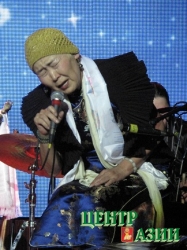 She had two names. Only one remained - a mysterious one. She had two names. Only one remained - a mysterious one.
She herself is a mystery.
Avant-garde. Intriguing. Non-standard. Not subject to aging.
Improviser and experimenter, constantly surprising others and able to surprise herself.
Sainkho Namtchylak, who sings in voices of winds and hurricanes, stars and birds. She makes drawings with tea and coffee. She writes poems without punctuation and without rhyme - by a stream of consciousness.
Having conquered world fame, she for a long time remained misunderstood and unrecognized in her own native country - in Tuva. And it made her suffer. Even mysteries can suffer.
"Bright fragment
Of bare reality
Virtual beauty
Counterweight
Behind a curtain of phrases
And associations
Memory protects
A forgotten corner
Where they wait with love or without it…
Familiar and dear
Not like all others"
This is from her poems - lines that Sainkho chose for an autograph to readers of "Center of Asia", for which she gave her most sincere interview about life and art. It is the first time in her life that she gave an interview like this, because the journal is one of her native country, the sound of which can be heard in each, even the most avant-garde of her compositions.
All you have to do is listen carefully.
To Love - with full force
- First of all, let's finally sort out your name. According to your birth certificate, you are Lyudmila. Later your stage name became your name. only your maiden name remained unchanged - Namtchylak.
There are no real problems with the last name, but there are many different mistakes made in your first name everybody writes it any way they want, even on the Internet.
To establish now and forever the correct spelling, please write it here in my notebook.
- Yes, true, sometimes they make mistakes in my name. The correct way is like this in the Cyrillic, in Russian (Sainkho Namchylak). In Latin transliteration, it is like in my Austrian passport: Sainkho Namtchylak.
- Sainkho, on 30 April in Kyzyl, at the concert in the House of National Art, when the decree was read about awarding you the title "National artist of Republic Tyva", and chairman of the government Sholban Kara-ool presented you a bouquet of flowers and an envelope with the decree, you were so touched that you almost cried.
Is it so important to you?
- Yes, very much. Because it is recognition by the people, which I have been waiting for such a long time. I could not even imagine that it could happen.
When I heard - National Artist - suddenly such a wave of emotion overwhelmed me, that I was afraid of only one thing: if I start crying now, I won't be able to control my voice, and my make-up will run. I really had to control myself. And then there were so many flowers, so many roses from my countrymen!
- So was this title confirmed, did you really feel like a national artist during your concert tour through the western districts of Tuva?
- Yes. People would literally worship me. The way they welcomed me was magnificent. When Tuvans love somebody, they do it with full force, they practically pray to you.
Great thanks to Sholban Valerievich Kara-ool, who assigned a "Volga' and a "Gazelle" for our road team - the group "Tyva Kyzy"" led by Choduraa Tumat, Igor Koshkendey, Aidysmaa Koshkendey, Andrei Mongush, and Opal Shuluu, our oldest singer, who is 81 years old. 81 years old, and just imagine it - she sings. It was a concert of superstars.
Myself and Opal Agban-Shirapovna rode in the "Volga". She was in the front seat, and I was in the back, with legs folded. That is how we got to Teeli village.
We arrived to the music school, and girls in national costumes were already waiting to meet us with bowls of tea. Well, it was a welcome like for a government delegation. Then they laid a festive table with khan (blood sausage) and fresh meat. When I was leaving, they even gave me meat to take along.
They put us up at the hotel. It turned out that they even had a hotel, it was surprising. And a private one at that. We were in the same room with Opal Agban-Shirapovna.
On the same day we gave the concert. And at the end of the concert - ovations, standing ovations.
Ak-Dovurak, Chadan and Shagonar were the same. They were concerned about us, kept asking: did you eat, did you have a nice rest? They were so attentive that sometimes I felt a bit awkward.
When we performed in Shagonar, my relatives, and the closest relatives on my father's side who live in the Ulug-Khem district, made a special trip from Eilig-Khem and Aryg-Uzyu villages just to take a look at me.
And after the concert they set up a banquet table in a separate room: fresh meat, vegetables, salads, village cream, pancakes, Tuvan salt tea with milk. They invited my musician colleagues. They fed and watered absolutely everybody. Such attention! That is how my relatives celebrated my national title and the end of the tour in Western Tuva.
I have a sea of impressions from the trip. No - a whole ocean !
In Ak-Dovurak, we stayed with children in the boarding school. The little kids were disabled, but they had so much love to give! They are simply walking volcanoes of love. I wanted to hug them all, because they are so brave. And I had this feeling that they can see through me.
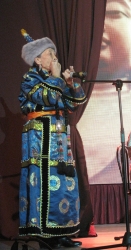 When we were coming back after a meeting with the mayor, I saw a little disabled boy, about nine years old, sitting on the stairs, and I felt at a distance of 500 meters that he was saying: "I love you!" When we were coming back after a meeting with the mayor, I saw a little disabled boy, about nine years old, sitting on the stairs, and I felt at a distance of 500 meters that he was saying: "I love you!"
When I came closer, I could hear that it was precisely what he was whispering: "I love you, because you sing."
There were few people at the concert in Ak-Dovurak. They explained to us that here they like pop-music: concerts below zero.
The hall was only about one third full, and half they let in for free you can feel throughout the place that the people are really poor, they have no money. There are many disabled people in wheelchairs, but at least they have wheelchairs.
Did you see the film "Kin-Dza-dza"? So this House of Culture reminded me of such an object that fell down from another planet. Such a weird, huge, empty room with high ceiling. It absolutely did not give any feeling of coziness. And acoustic music needs coziness. Or else you have to place the musicians and audience in a special way, like in churches or temples.
When we played in that hall on acoustic instruments, the sound was completely lost. But they liked it anyway. So much enthusiasm! One girl even told me in rapture: "You are simply a goddess!"
The young peole came up for autographs with their concert tickets, with photographs, with their favorite books - that has become fashionable, to ask for an autograph in a favorite book - any book.
And that is how it went after every concert. Huge amount of enthusiasm. And after every concert they gave us letters of gratitude and certificates.
I have not felt a deluge of love and contact in a long time, probably not since childhood. I understood that I have truly become a singer-storyteller recognized by the people. That I have become a human legend.
Beloved Mountains
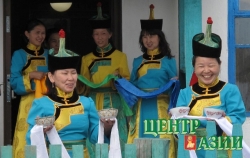 - It is unbelievably complicated to be a human legend; do you feel how different you are from your countrymen? - It is unbelievably complicated to be a human legend; do you feel how different you are from your countrymen?
- Yes, it is not simple. It is a great responsibility. I feel how different I am: I have lived abroad too long.
I feel how they deify me. And they forgive, they do not notice the deficiencies that I myself see. I was not completely healthy during these tours: I thought that I simply got a cold, but it turned out that the problem was in my leg. I Kyzyl, when I was crossing the street, I fell down and scraped my knee on the asphalt. Stupid story. At first I did not pay any attention to it, but the wound got infected. I had fatigue, chills, and my voice was going. Sometimes I worked with the last breath.
So that at the end of the program at one of the concerts I sang the favorite song of Tuvan spectators "Daglarym" - "My Mountains" in a hoarse voice. But the people were pleased anyway, they were happy. And I was happy too, that I could give them such a feeling.
The clip "Daglarym" was recorded in 2002 during the festival of faith and live music "Ustuu-Khuree", by the temple ruins. The words are by Stepan Saryg-ool, the music by Rostislav Kendenbil, Tuvan classics. And it seems that since then the clip was shown many times on Tuvan TV.
I think that it was with this song that they began to recognize me in my native country. At the concerts, everybody literally begged us to perform "Mountains".
For me, my native mountains are special. I would like to build a castle in an inaccessible place somewhere in the mountains and to live there, hiding from the world. Such an impossible dream.
I love Tuvan mountains very much. No matter what happens in my life, the mountains will be waiting for me as patiently as the suns that wait for millions of years and see everything. Just like in the song "Daglarym": my plush mountains, my memories of childhood.
You know, when we were in Switzerland, this is what we would often do: we would get up very early in the morning, take a day pack and two sandwiches, and the whole day until night - would go into the mountains. We would stay overnight, they have sort of small cabins with rooms of 20 beds, and back into the mountains in the morning. I miss these trips very much.
I wanted to get up on Mongun-Taiga during this two-week visit to my native country, but that incident with my leg it did not work out.
But after the concert in Chadan I visited Ustuu-Khuree, I took a look at the way the rebuilding of the temple is s going on next to the ruins of the old one.
To bring in a contribution
- What impression did you get from this visit to the temple ?
- A complicated one. The construction of the temple has stopped. They have no paint. The workers - six people - sit there by the door. One monk was walking around.
I went to Aldyy-Khuree - a temple right in Chadan, and there was one monk sitting down, reading, and his assistant was in the back room with a computer. That was all.
It seems to me that it could have been expected. And do you know why? Because it is like the first wave after the perestroika: now, finally, we can build something entirely different, something different from the past seventy years.
And it is twenty years since 1991, when lamaism and shamanism were legalized. And what do we see? Before the perestroika it was romantic because it was dangerous, but now that everything is possible, it is not interesting anymore.
What I have to say about it is that nothing works right away: twenty years is nothing. To preserve and develop the religion further, it is probably necessary to find new forms, and to not be afraid of the openness of those new forms.
Before, during the Soviet era, there was this awful combination of words: "to deal with religious needs". It sounds terrible! And now they have gone to another extreme: they began to mystify too much, they believe that the Buddha can help them get rich, healthy and happy.
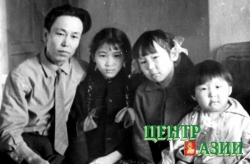 But it is impossible to count on god in everything, people have to work on it too, to put some effort into it, even just to make sure that ceremonies and rituals become a regular necessity. To simply scrupulously follow the rituals day after day, so that the good habit becomes a tradition. But this mechanism, it seems, is much more difficult to work out than it is to build a temple. They simply do not love their religion enough. But it is impossible to count on god in everything, people have to work on it too, to put some effort into it, even just to make sure that ceremonies and rituals become a regular necessity. To simply scrupulously follow the rituals day after day, so that the good habit becomes a tradition. But this mechanism, it seems, is much more difficult to work out than it is to build a temple. They simply do not love their religion enough.
You should not count on somebody else to do things for you, you have to make sure that you bring in your contribution as well. Into your tradition and culture.
- And did you bring in your contribution, too?
- Yes. Buyan Bashki was with us during the tour of the western districts of Tuva. He talked to the people during the concerts, telling the nation that the charity profits will go towards development of Buddhism in the republic, to build the statue of the Buddha on Mt. Dogee near Kyzyl.
And all the artists, including me, performed as a charity donation, that means for free, without pay. After the concerts they just gave me money for a ticket back to Krasnoyarsk, where I had the next performance.
But when I perform for money, then my fee is a minimum of 500 Euro for a concert. That is the lowest possible, it is not possible to go any lower, because I have an international name and international tariff.
This time I gave six concerts in my native country, that is equivalent to three thousand Euros, but not in money, in performances.
I propose to continue the tour through other districts of Tuva and to widen the scope to Mongolia and China. And the profit from those concerts would go towards building the statue of the Buddha. Since our lamas decided to, and have started to save money for this purpose, it can't be permitted to just eat the money up. But means are needed to organize these concerts. And, of course, very promising and responsible, serious people, dependable ones are necessary; that would guarantee that the statue project is real, not just a dream.
And another thing is important: unfortunately, the charity contribution of artists here in Tuva is not appreciated and it is not considered that this is an affront to the artists. And it is not a very respectful attitude towards people of the arts.
I have seen it before. When I came to Chadan in 2002 to the "Ustuu-Khuree" festival, they had a list of sponsors: all those who donated their money for the festival. It did not matter if it was 100 rubles or 50 thousand; all the names were listed. And that is the way it should be.
But for some reason the names of the artists who performed for free were not on the list. Even though many of them came from outside of Tuva on for their own means, often spending quite a lot of money for the trip. Just like me, for example, who came on my own, and it was far from cheap.
Charity actions are done abroad, too, but it is formulated in a different way, with more respect for the participants. For example, there was such an action in Vienna. A certain poet died, and there was a collection for a memorial. They sent us letters, inviting us to participate in the benefit concert.
After the concert, everybody who agreed, was asked to sign a note that we received our pay, but did not take the money, and gave it to the organizers of the action. So we signed that we received 500 Euro, and donated it right back to the benefit. Everything crisp and clear.
Fifteen Minutes of Childhood
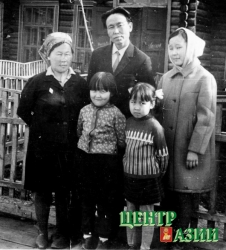 - Sainkho, every person has a biological and psychological age - whatever one feels. In your feelings, how old are you today? - Sainkho, every person has a biological and psychological age - whatever one feels. In your feelings, how old are you today?
- Thirty-two. That is how old I feel today.
- Is it a lot less than your biological age? Of course, if it is a secret date, the question is retracted as tactless when concerning a woman.
- No secrets at all. According to my passport, I am 54. I was born in 1957, 11 March. In Pestunovka village of Ulug-Khem district of Tuvinian ASSR. In Tuvan the name of the place was Beldir-Kezhii.
They took me away from there when I was very tiny, and I have never been back. Now the place does not exist anymore. When we were on the tour, we passed through approximately that area, but I could not tell where exactly the place of my birth was.
You know, some people remember their childhood very well chronologically, but I do not have any sharp recollections of dates and events, I remember only images. There are bright moments of memory which I can't forget or wipe away.
Kok-Khaak village, in Kaa-Khem district, under Saryg-Sep. we lived in a house on the edge - steppe and plush mountains were right there.
I am standing there, about five or six years old. I am looking at the steppe; some kind of a mirage is moving from the mountains, colorless air is moving, something invisible is coming across the whole huge steppe and disappearing behind the mountains.
Then I see something glitter in the steppe, like a diamond, I run up to it and there it is - an ordinary greenish fragment of glass, then I turn my head and I see a tractor driver driving a light-blue tractor, and he also turns his head and our eyes meet. And I feel that something mysterious is going on, that is impossible to describe in words.
Then I see moving dark clouds like lead, and I know that a storm is coming. I run into the house to my mother's sister, I sit at the table and watch a fly banging against window glass. And I feel the chair pinching my pants and dress. I simply sit, watch the window and wait to hear the first thunder. And then I watch raindrops running down the glass.
And afterwards I remember this simple episode for the rest of my life: fifteen minutes of childhood.
I also remember very well how I ran away from my grandmother. I crept out under the fence and went to my mother's workplace. She worked as a young kids' teacher, and I went there to fight with the kids, to prove to them that she is my mother - not theirs. I got there, and managed to beat up the kids, until either my mother or an assistant caught up and dragged me away.
And I did this every day until they took me away to another district.
I figured out only much later why I was doing that; my mother told me that before that, for a time I lived in a children's home. She and my father left me there for a short period, when they were finishing school. And when they came to pick me up, all the children ran up to them yelling: "This is my mother and father!" And only I, their real daughter, stood there, turned to the window, and did not want to recognize them - I was so upset about it.
Apparently, these impressions from a children's home formed into a firm decision in Kok-Khaak: one has to fight for one's mother! She is mine!
- What did your parents give you?
- Life, upbringing, education. They helped me to bring up my daughter. From Papa, I am a romantic with some kind of unusual perception of the world. From Mama - I got optimism and energy.
They both have pedagogic education. Papa, Okan-ool Kyrgysovich Namchylak, lectured, worked in Tuvan TV, and was a member of the Journalists' Union of USSR. Mama, Tatiana Arakchayevna, lectured at school, in the lower grades.
There are four children in our family - three sisters and a brother. I am the oldest, they used to call me Lyudmila back then. The next is Maiya, there are four years between us. Maiya and Urana are only two years apart. And Urana with Sergei, whom we call Ayas at home, are six years apart.
My parents adopted Ayas when he was a baby. But now, and this is very amazing, I look and see that he is very much like my father - in character, his gait, his figure, even his exterior. And this likeness is getting stronger with years.
Maiya is a house wife, lives in Kyzyl; Urana is a medical nurse, lives in Todzha district, and Ayas works in the militia, lives in Kyzyl.
Mama and Papa are not with us anymore.
- Did you start your musical career right after school?
- No. At first I had an unsuccessful attempt to get immersed in a working profession. I finished School No. 2 in Kyzyl, and right after the graduation evening I went to Moscow - to a weaving factory.
It was because I had this little list of prestigious universities, where one could get admitted without competition if you become an exemplary working class and work for two years.
But this attempt at immersion into a working profession was unsuccessful, I lasted only two or three months. My father even wrote to the "Pravda" newspaper about what went on there: they did not give the students our allowance, there were fourteen beds in one room, and the barley that they cooked in the cafeteria had mouse droppings in it.
I returned to Kyzyl, went to the Kyzyl Art School to the choir conductor department. But I did not finish - because of love.
Voices of the Enemy
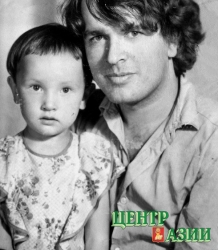 - And who was he - your first love? - And who was he - your first love?
- Oleg Lazarevskiy - my first husband. He was a musician, a Muscovite. He came to Kyzyl with the other guys by assignment. The others were also from Moscow or around. They worked at the Philharmony.
We met in 1975. We were friends and so on. Oleg hired me as a soloist into the "Elegest" vocal-instrumental ensemble which they founded.
Oleg is eight years older than me. But the crew that he came with was even older. Such old wolves - how awful! They brought and listened to such things! Forbidden things. I was afraid to listen to some of the recordings.
Well, for example "Pink Floyd" and "Led Zeppelin" one could maybe listen to. But they listened to tape-recorded broadcasts of BBC.
- They listened to the voices of the enemies? Those programs broadcasted from London by the former Soviet saxophonist Seva Novgorodtsev, that started with the musical phrase "Seva-Seva Novgorodtsev, city London, Bee-Bee-Ceeeeeee"?
- Yes, those. "Seva-Seva Novgorodtsev, city London, Bee-Bee-Ceeeee". It was all the newest hits of Western rock music, and the BBC recordings would be re-recorded from a tape-recorder to another tape-recorder - they still had those huge reels with tape - and would be distributed from one person to another.
With Oleg, we brought those forbidden recordings to Kyzyl. Even the church "All Night Mass" was forbidden. Even though at first I did not understand much of it, I was the youngest in that group, and the only Tuvan.
And they also drew - some incomprehensible abstract drawings. That was the first time I ever saw abstract drawings.
- When did you and Oleg Lazarevskiy get married?
- In seventy-six or seventy-seven? I have forgotten. I was already pregnant, so that must be - seventy-seven.
Oleg is now completely different, he has changed very much, he is very-very religious, sings in a church choir in Moscow. And everything that he used to do - "Pink Floyd", his experiments in Tuva - in the VIA "Elegest" - he thinks was wrong, simply a temptation.
The new program of "Elegest" was not passed by the ideology committee of the ministry of culture, it was headed by Valentina Vladimirovna Oskal-ool back then. A strict woman, even though she was quite out of the ordinary for those times. She dressed fashionably, extravagantly, and we were always noticing new items of her wardrobe. The program was prohibited as unsuitable, not conforming to the ideological parameters.
So we went all over the place: at first to Novosibirsk, then to Moscow. We got to Moscow, and right away on the third day I gave birth. Our daughter Chai-Suu Lazarevskaya was born on 13 July 1977.
We thought together for a long time about a name for her. There were different possibilities, for example - Varvara. Varvara Olegovna Lazarevskaya - that has a sound to it.
Then we decided on Chai-Suu. Chai-Suu Lazarevskaya also has a sound to it.
- What is your daughter doing now?
- She works for a journal's publishers in Vienna, and lives close to me with her son. Timur is now eleven years old, he was born in 1999. When they were registering his birth, they had to think for a long time, and argued about how to write his last name correctly.
In principle, Chai-Suu could have given him her own last name, because she is bringing him up alone. According to Austrian laws, a child can get either the mother's or the father's last name. But he can't have his grandma's name.
But if he had Chai-Suu's last name, he would be Timur Lazarevskaya. That sounds pretty bizarre to a Russian ear.
I German, the last names do not have masculine and feminine gender, so the child's last name would be registered on the birth certificate literally letter for letter like his mother's.
I met a man once whose name was like that: Stefan Ivanova.
So she chose his father's last name for Timur: Suleimanov. Timur Suleimanov. And they do not use a patronymic in Austria.
- So your grandson Timur is really a citizen of the world: citizen of Austria, with all the Russian nationalities mixed in him.
- Yes, he is half-Tatar, quarter-Russian and quarter-Tuvan.
Hallucinations from Hunger
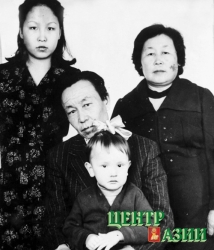 - And did your musical education, which was interrupted in Kyzyl because of love, continue in Moscow? - And did your musical education, which was interrupted in Kyzyl because of love, continue in Moscow?
- Yes. I entered the Ippolitov-Ivanov music school in Moscow, now it is a music-pedagogy institute.
I was in the folk-song department, a Russian folk song at that. I, who came from a remote province, was accepted as an exception, because they were surprised by the range and flexibility of my voice. The instructor in choir was always changing my position: at first I was with the second soprano, then with the first alto, then with second alto. And I could change over very easily.
And it is interesting that I finished school in two instead in four years. In the first place, I already had preparation from Kyzyl, and the second - I wanted to learn so much! I had already sent my daughter to Kyzyl to live with my parents, and I was so lonely. So to keep from being homesick, from missing Tuva and my parents and daughter, I immersed myself in studies.
I worked so much and did not eat enough, so that I even had hallucinations from hunger.
- What about Oleg, did he not feed his student wife?
- By then he had already left me a long time before, and went to Novosibirsk. Now Oleg is in his fourth marriage and has a new child: my and his grandson is six years older than Oleg's youngest daughter.
- And what kind of hallucinations did you have from hunger?
- Most probably my future? I remember I got home very tired, and there was nothing in the house. I boiled a potato. And a little bit of mayonnaise from the jar, about a teaspoon of mayo to a scoop of potato, to stretch it a little bit. Instead of tea - simply some boiled water, and it was warm in the stomach, so I went to sleep.
And in front of me there was Oleg's little chamber piano. He brought it and left it. And as I am looking, something was flickering above the piano and I felt like I was sinking I saw a gray-haired man's face. A terrible feeling of overwhelming fear.
I always had a very high inner associative perception.
I remember when I saw Stravinsky's ballet "The Rite of Spring" for the first time, I had a feeling like all space was broken up into geometric shapes - pyramids and triangles, just like Kandinsky's paintings., and it all suddenly began to open up. Just like if I was inside this painting.
It was terribly interesting to me to study and learn. After school I continued my education in Moscow, at the Gnesin State music and pedagogy institute. Then I continued with a two-year aspiranture. And I was expected to start research work. They wanted to keep me at the institute as an instructor.
Cabbage - From Canada to Australia
- What turned you away from the normal and safe life of an instructor?
- What happened in Krasnodar in 1986 at the All-Russia contest of folk song performers.
You should have seen what the people were doing in Krasnodar, those who saw the performance remember it to this day.
I showed them song-dance: I danced and sang at the same time. And I did throat-singing - sounds imitating bird song.
I received the second prize and a special Irma Jaunzem prize; she was a National artist of RSFSR who collected and performed songs of all the nations of the world.
They were simply certificates, no money went with it but it was such a feeling I won, I was successful! And my vocals teacher at the school was in seventh heaven from happiness. "I knew it, I always believed in your voice!" Marina Petrovna Sergeyeva was from Donbass, she had two sons and I was practically like her third child. I could always come to her home, and she would give me tea and make a sandwich with butter and sausage, which was hard to get, give me needed books, listen to my problems and help with advice.
So after the victory in Krasnodar, in that same eighty-sixth year, I first went abroad from as it was then USSR - with a delegation of Soviet Union artists.
The first trip was to Spain. Then Canada, USA - from New York to Seattle and back. Then the Philippines, New Zealand, Australia. We even went to Tasmania - south of Australia.
In artist jargon this was called "cabbage" - kind of a mixed pickle show: horse riders and drummers from the Caucasus, artists from Chukotka, from Krasnoyarsk ensemble of song and dance, from Piatnickiy's choir, Bashkir kurai players, and me. I sang Russian, and Northern, and Tuvan songs. A two-minute Tuvan song, Nanai song, a Saami song that is a nationality that lives in Russia an Kola peninsula.
We did not get paid for the concerts. Instead we saved up the allowance that they gave us for food, so that we could buy something from abroad.
We did not go to restaurants, but instead we ate in our hotel rooms. We each had an enamel mug and a little immersion water heater. We boiled water and threw in bouillon cubes, which we would get before the trips by hook or crook, because back then there were shortages of everything and everything was by coupons only.
And all the things we brought from the hotels: tiny soaps, little bottles of shampoo, some kind of program leaflets. We collected all this stuff to take home as presents, and to show them: look at this unbelievable little soap with a soapbox, and a tiny tube! Stunning!
I remember on the first trip - to Spain - I bought shoes for the money saved thanks to bouillon cubes and the immersion heater: sort of soft sneakers, bright-bright yellow in color, you could see them at a distance of three kilometers.
My mother used to sew very nice hats, she could make a very elegant one from a few little pieces of fur, like a beret. So in Moscow I bartered my mama's beret for a bright pink coat.
So I wore these very yellow sneakers and bright pink coat, and everybody would look at me, because they all thought I was a foreigner. It was considered especially chic to look like a foreigner. And I was terribly proud of my appearance.
To be continued.
Photos:
- Singing in the voices of winds and hurricanes, stars and birds. Sainkho Namtchylak at the benefit concert at the House of national art in Kyzyl, 30 April 2011. Photo by Elizabeth Gordon.
- Performance of Opal Shuluu, the oldest Tuvan singer, throat-singer, at the benefit concert organized by Sainkho Namtchylak and "Tyva Kyzy". Kyzyl, 30 April 2011. Photo by Elizabeth Gordon.
- Bai-Taiga welcomes Sainkho. Teeli village, 2 May 2011. Photo by Elizabeth Gordon.
- Father Okan-ool Namchylak, childhood friend Lyuba Byurbyu. Lyuda - the future Sainkho, and her sister Maiya. Kyzyl, 1966.
- Namchylak family. Mother Tatiana Arakchayevna, father Okan-ool Kyrgysovich, daughters: Lyudmila, Maya, Urana. Tuvinian ASSR, Ulug-Khem district Bayan-Kol village. 1971.
- Oleg Lazarevskiy, musician, founder of vocal-instrumental ensemble "Elegest" in Kyzyl, which "did not correspond to ideological parameters", Sainkho's first husband, with their daughter Chai-Suu. 1981.
- Back then she was still Lyudmila. With her father, mother and daughter Chai-Suu. Tuva, 1981.
|
